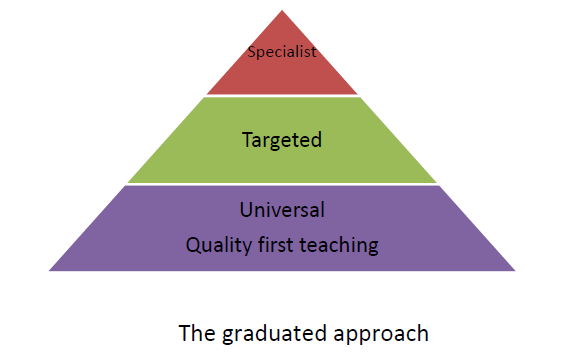Graduated Response and Agency Advice
If a student is not making academic progress in an area of the curriculum the SENDCo will ask the following questions:
- Are the pupil’s learning needs being met through personalisation as part of quality first teaching?
The SENDCo may complete a learning conversation with the pupil and the teacher and observe the student in their lesson. This will help to determine whether the activities are accessible, personalised effectively for the individuals learning needs, set at an appropriate level of challenge, in line with recommendations outlined on the pupil passport (if one exists) and if the student is committed to engaging in the lesson.
If the student’s learning needs are being met at this level the next question the SENDCo will ask is:
- What classroom level interventions are in place?
These interventions might include:
- Additional homework set to consolidate learning.
- Over learning opportunities by emailing powerpoint from the lesson to the student/parent to revisit following the lesson.
- Allocation to a focus group with teacher/support adult (if available).
- Seated next to more able peer.
- Provided with modelled examples, structured templates, word banks, support cards etc
- Conversations with students and/or parents.
- Compulsory attendance at revision sessions.
- Consolidation starter activities every lesson.
If these interventions are in place and embedded practice, the SENDCo will next question:
- What intervention is required from the SEND department?
The student will be allocated to an intervention group based on their existing barrier to learning. This may be for processing information, memory, dyslexia, dyscalculia, reading, writing or maths.
Interventions run for approximately 6-12 weeks and are reviewed weekly to ensure they are having an impact. Following the intervention students are given a further 6 weeks to implement their learning in to a classroom context. Progress is then reviewed.
During this time the student may also complete a range of screening tests using our ‘SEND toolkit’ created by GL assessment. This toolkit has the capacity to screen for dyslexia, short term/visual/auditory memory, processing, reading speed/accuracy/fluency, writing speed/accuracy and maths. It is not a diagnosis but a very useful tool to determine the areas of difficulty.
If the student is still not making progress then the SENDCo may ask?
- What external agency involvement is required?
It may be necessary to seek the advice and support from an external agency. Typically this is the Learning Support Advisory Team (LSAT) although other agencies may be drawn upon. This agency can support the school in a variety of ways at the schools request including student observation, student assessment or training. The school purchases a package of support from this agency that has a specified number of hours; therefore not every student not making academic progress will be seen by LSAT. Priority will be given to those students who have completed a range of intervention programmes unsuccessfully.

